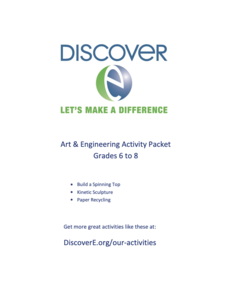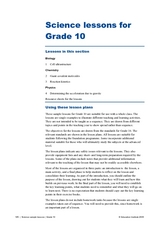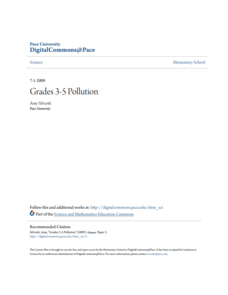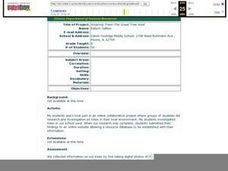Science Matters
Matter Cycles — Sum It Up
Scholars become part of the cycle of matter with a reader's theater that showcases producers, consumers, decomposers, and the sun. A diagram and discussion concludes the learning experience and enhances comprehension.
California Academy of Science
Earthquakes and Tectonic Plates
Here is a comprehensive package in which middle schoolers learn about types of seismic waves, triangulation, and tectonic plate boundaries. Complete vocabulary, colorful maps, and a worksheet are included via links on the webpage. You...
National Institute of Open Schooling
Chemical Arithmetics
Substances with the same empirical and molecular formula must be differentiated by their structural formula. Part two in a series of 36 has pupils using chemical formulas to calculate how much of a compound is present in a given...
Science Matters
Ring of Fire
Over a period of 35 years, earthquakes and volcanoes combined only accounted for 1.5 percent of the deaths from natural disasters in the United States. The 15th lesson in a 20-part series connects the locations of earthquakes and...
Lerner Publishing
Living or Nonliving
It's alive! Or is it? Through a series of shared readings, whole class activities, and independent exercises children explore the difference between living and non-living things, creating a pair of printable books...
DiscoverE
Art and Engineering Activity Packet: Grades 6-8
Build an appreciation of engineering. Pupils in grades 6-8 learn about science and engineering in a set of three engaging activities. They build spinning tops, construct wind structures, and create recycled paper as part of an engaging...
Texas State Energy Conservation Office
Investigation: Automotive Emissions and the Greenhouse Effect
It is recommended that you conduct this fabulous experiment as a whole-class demonstration. Collect air samples from the environment, human exhalation, and car exhaust, then compare them for carbon dioxide content using bromthymol blue...
LABScI
Genetic Equilibrium: Human Diversity
Investigate the Hardy-Weinberg Principle to explain genetic equilibrium. The 10th lesson plan of a series of 12 is a laboratory exploration of genetic equilibrium. Your classes use a mixture of beans to model allele and genotype...
Baylor College
Pre-Assessment Activity: What Do You Know About Microbes?
In an introductory lesson, youngsters take a pre-assessment quiz, get a grasp of a gram of mass, and then estimate the mass of microorganisms that live within a human body. Using Glo Germ™, a material that allows you to simulate the...
Curated OER
Science Lessons for Grade 10
Tenth graders identify the parts and functions of the cell. In this series of science lessons, 10th graders investigate crystal formation in covalent compounds. They investigate the factors affecting reaction rates.
Curated OER
What Does it Take to be a Survivor? Part One
Students explore marine animal adaptation. In this introductory ocean life biology lesson, students access prior knowledge by participating in a whole class "thought swap." Students form two lines, respond to a prompt from the teacher...
Curated OER
Science Lessons for Grade 11
Students explore different activities in biology, physics and chemistry. In this science instructional activity, students examine chromosomes using a microscope and explain their significance in sustaining life on Earth. They investigate...
Curated OER
Science Drawing
In this drawing in science worksheet, students read about what is needed to complete a drawing in order to communicate ideas and discoveries in science. Students analyze a drawing of a volcano and indicate the problems with the drawing....
Code.org
Practice PT - Design a Digital Scene
The final performance task for the unit requires class members to utilize what they have learned to create a personal digital scene. Groups work together to develop a scene and then, using top-down design, break the scene into...
Curated OER
Five Senses Dice
Engage young learners in exploring the five senses with this fun dice template. Including pictures of a mouth, ear, nose, hand, and eye, this resource allows children to demonstrate their knowledge of body parts and what they are used for.
Pace University
Pollution
Over the course of 10 days, scholars take a pre-assessment to place them in one of three leveled groups. Whole-class and in small groups, pupils take part in read-alouds, field trips, hands-on activities, and complete learning contracts...
Curated OER
Science: The Great Tree Hunt
Sixth graders participate in an online, cooperative project researching trees in their local environments for use in an online knowledge game. They take digital pictures of the trees, bark, and leaves. After completing their research,...
Gallantsbiocorner.com
Cell Organelles
Young scientists take a trip into the microscopic world of cellular biology with this practice exercise. Given pictures of different organelles, students must correctly identify specific parts of each cellular structure to demonstrate...
Massachusetts Institute of Technology
Nuclear Synthesis
Start this lesson with a bang! The eighth in a 13-part series of lessons explains the origin of elements beginning with the Big Bang Theory. The reading describes the formation of elements hydrogen through uranium.
Curated OER
Number Line Mathematics
Young scholars translate problem situations into diagrams, models, and numerals using whole numbers, fractions, mixed numbers, decimals, and percents. They identify that numbers in different forms are equivalent or not equivalent using...
Curated OER
Traveling Through the Digestive System
Second graders learn about how the food is broken down in our bodies and the job of each body part involved in our digestive system. The utilize the CD ROM game, "Body Works." This wonderful game takes pupils through the human body's...
Curated OER
X-ray Spectroscopy and the Chemistry of Supernova Remnants
This link takes you to a comprehensive unit that delves into emission spectra and supernovas. There are four parts: How and where elements are created, electromagnetic radiation, spectroscopy, and the newest technology for studying our...
Curated OER
Forces Acting on a Spring
Teaching elastic forces in your physics class is a snap with this resource! Scholars compare the stretch of rubber bands with differing width, then measure the stretch of a spring and calculate force. In a whole-class experiment, wire is...
Curated OER
Two Beets Or Not Two Beets—What Is Your Question?
Students use the scientific method to test an idea regarding the structures of a plant as it supports the biological evidence for life. In this growing roots lesson plan, students use organizing sheets to record their findings. Students...























